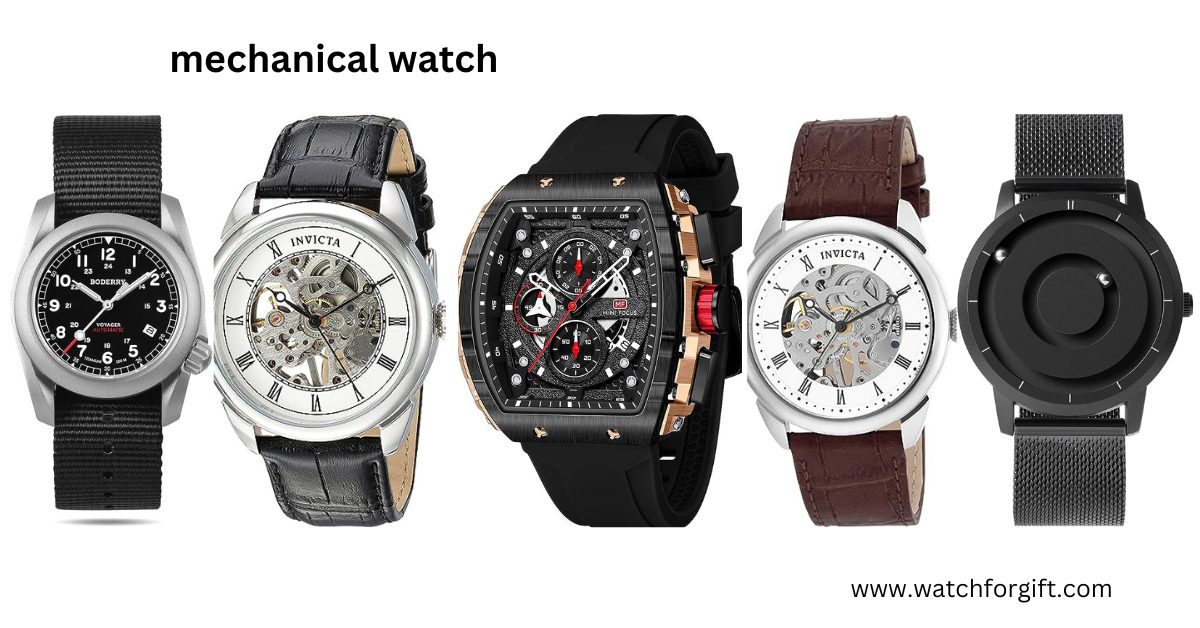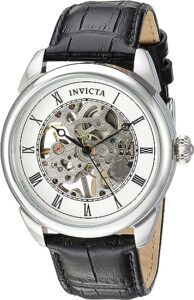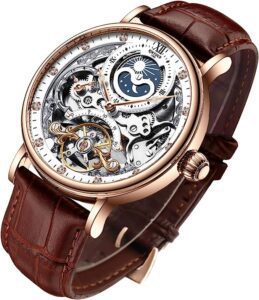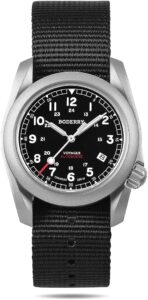In the realm of timekeeping, where precision and craftsmanship converge, mechanical watches stand as a testament to the ingenuity of human engineering. These exquisite timepieces, often regarded as horological masterpieces, have captured the hearts of watch aficionados for generations. Join us on a journey through the intricate world of mechanical watches, where we unravel the artistry, craftsmanship, and allure that make them truly exceptional.
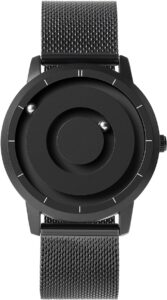
The Timeless Elegance of Mechanical Watches
Mechanical watches, unlike their quartz counterparts, are powered by a symphony of gears and springs meticulously assembled by skilled watchmakers. This mechanical marvel brings an unmatched elegance to timekeeping. Let’s delve into what makes mechanical watches the epitome of sophistication.
The Intricate Dance of Gears
At the heart of every mechanical watch lies a complex network of gears, each with a specific function. These gears work in harmony to transmit energy from the mainspring to the escapement, regulating the release of energy and ensuring accurate timekeeping. This intricate dance of gears is what sets mechanical watches apart.
The Artistry of Watchmaking
Crafting a mechanical watch is not merely assembling parts; it’s an art form. Experienced watchmakers devote years to mastering their craft, using precision tools to painstakingly assemble tiny components.The precision and attention to detail necessary in watchmaking is comparable to that of a fine jeweler constructing a masterpiece.
The Allure of Hand-Winding
One of the distinguishing features of mechanical watches is the act of hand-winding. Turning the crown to wind the mainspring is a tactile experience that connects the wearer to the heart of the watch. It’s a ritual that enhances the sense of ownership and connection with the timepiece.
The Journey Through Time
The history of mechanical watches is as rich as the intricate movements within them. Dating back centuries, these timepieces have evolved through the ages, leaving a legacy that is still cherished today.
A Peek into the Past
Mechanical timepieces can be dated back to Europe in the 14th century. Early designs were rudimentary, but they laid the foundation for the horological wonders we admire today. These early watches were a symbol of status and sophistication, often adorning the wrists of royalty and nobility.
The Mechanical Renaissance
The 18th and 19th centuries saw considerable advancements in watchmaking. Breguet and Patek Philippe emerged as master watchmakers who pushed the bounds of innovation. Complications such as perpetual calendars, moon phases, and tourbillons became the hallmark of mechanical watches.
Modern Mechanical Marvels
In today’s world, mechanical timepieces continue to enchant collectors and aficionados.The names Rolex, Audemars Piguet, and Omega are all associated with elegance and precision. Combining traditional craftsmanship with modern technology has produced clocks that are not only accurate but also visually appealing.
Why Choose a Mechanical Watch
In a world dominated by quartz and smartwatches, the allure of mechanical watches remains undiminished. Here are some compelling reasons why connoisseurs and aficionados choose these timeless timepieces.
Craftsmanship and Heritage
Owning a mechanical watch is like possessing a piece of history. These watches are often handcrafted by skilled artisans who have inherited the traditions of watchmaking. Each piece carries the legacy of centuries of horological expertise.

Timeless Aesthetics
Mechanical watches are not just instruments for telling time; they are works of art. The intricate dials, finely polished cases, and mesmerizing movements make them objects of desire. They are intended to be passed down through generations as heirlooms.
Connection and Ritual
Wearing a mechanical watch fosters a unique connection with time. The act of winding the watch, feeling the rhythmic ticking of the movement, and witnessing the intricate gears in action creates a sense of appreciation for the passage of time.
Caring for Your Mechanical Watch
To ensure that your mechanical watch remains a faithful companion for years to come, proper care and maintenance are essential. Here are some tips to keep your timepiece in pristine condition.
Regular Servicing
Mechanical watches require periodic servicing by experienced watchmakers. This guarantees that the sensitive components are cleaned, lubricated, and adjusted for optimal operation.
Avoid Extreme Conditions
While many modern mechanical watches are built to withstand some degree of shock and moisture, it’s best to avoid extreme conditions. Exposing your watch to extreme temperatures, magnetic fields, or water can affect its accuracy and longevity.
Winding and Setting
When winding your watch, do so gently and consistently. Overwinding can damage the mainspring. In addition, while setting the time or date, follow the manufacturer’s instructions to avoid errors.
In Conclusion
In the world of horology, mechanical watches shine as the epitome of craftsmanship, elegance, and heritage. Their intricate movements, rich history, and timeless allure continue to capture the hearts of watch enthusiasts worldwide.Owning a mechanical watch is more than just a timepiece; it is a piece of artistry and heritage that spans generations.
Frequently Asked Questions
- What is a Mechanical Watch?
A mechanical watch is a timepiece that operates without the use of batteries or electronic components. It relies on a complex system of gears, springs, and an escapement to keep time.
- How does a Mechanical Watch Work?
Mechanical watches are powered by a mainspring, which stores energy when wound. As the mainspring unwinds, it releases energy that drives the gears, regulating the movement of the watch hands.
- What Is the Difference Between a Mechanical and a Quartz Watch?
The primary difference is the power source. Mechanical watches are powered by a mainspring, while quartz watches use a battery to generate a constant electrical charge.
- Are Mechanical Watches Accurate?
Mechanical watches can be highly accurate, but they may require periodic adjustments and regular servicing to maintain their precision.
- What are Complications in Mechanical Watches?
Complications are extra features or functions that go beyond basic timekeeping. A date display, moon phase, or a chronograph (stopwatch) are examples of such functions.
- Do Mechanical Watches Need to be Wound Daily?
It depends on the type of mechanical watch. Manual-winding watches need to be wound daily, while automatic watches are self-winding and wind themselves through the motion of your wrist.
- Can I Swim or Shower with a Mechanical Watch?
It’s generally not recommended to expose your mechanical watch to water, especially if it’s not explicitly designed for water resistance. Water can damage the movement and components.
- How Often Should I Service My Mechanical Watch?
It’s advisable to have your mechanical watch serviced every 3 to 5 years by a professional watchmaker to ensure it continues to function accurately.
- Are Vintage Mechanical Watches Valuable?
Vintage mechanical watches can be highly valuable, depending on factors like the brand, rarity, and condition. Collectors often seek vintage timepieces for their historical significance and craftsmanship.
- What Makes Mechanical Watches Special?
Mechanical watches are treasured for their intricate craftsmanship, timeless aesthetics, and the emotional connection they foster with the wearer. They are more than just timekeepers; they are pieces of art and heritage.
Read More
Richard Mille Watches : A Status Symbol for the Fashion-Forward
Samsung Galaxy Watch 5 Bands : Where Fashion, Technology, and Individuality Converge
Affordable Luxury: Elevate Your Look with Casio Watches for Men!
